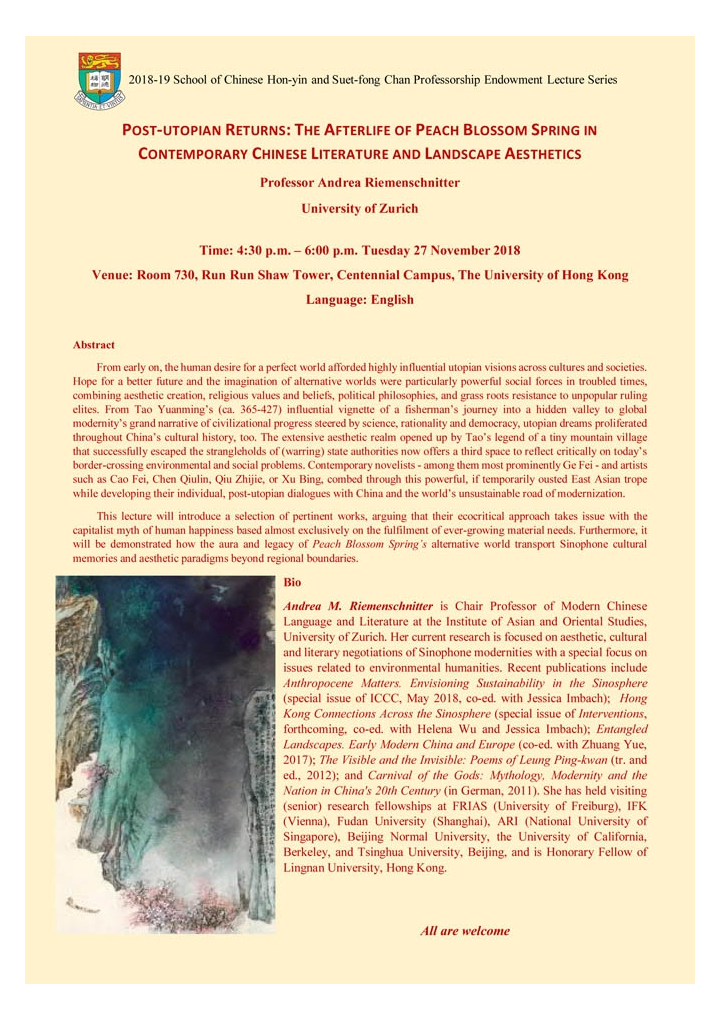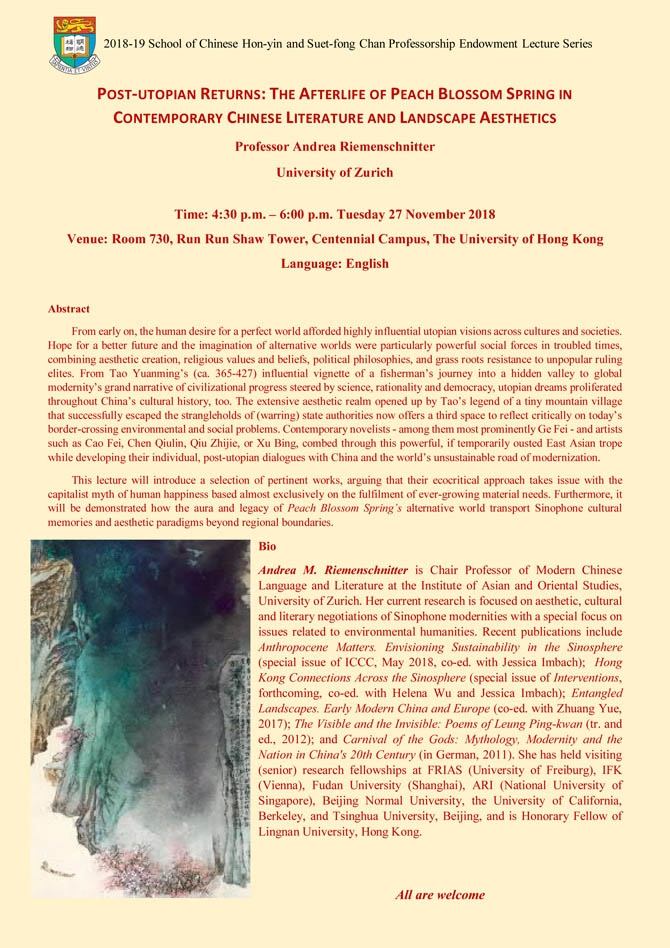POST-UTOPIAN RETURNS: THE AFTERLIFE OF PEACH BLOSSOM SPRING IN CONTEMPORARY CHINESE LITERATURE AND LANDSCAPE AESTHETICS

2018-19 School of Chinese Hon-yin and Suet-fong Chan Professorship Endowment Lecture Series
POST-UTOPIAN RETURNS: THE AFTERLIFE OF PEACH BLOSSOM SPRING IN CONTEMPORARY CHINESE LITERATURE AND LANDSCAPE AESTHETICS
Professor Andrea Riemenschnitter
University of Zurich
Time: 4:30 p.m. – 6:00 p.m. Tuesday 27 November 2018
Venue: Room 730, Run Run Shaw Tower, Centennial Campus, The University of Hong Kong
Language: English
Abstract
From early on, the human desire for a perfect world afforded highly influential utopian visions across cultures and societies. Hope for a better future and the imagination of alternative worlds were particularly powerful social forces in troubled times, combining aesthetic creation, religious values and beliefs, political philosophies, and grass roots resistance to unpopular ruling elites. From Tao Yuanming’s (ca. 365-427) influential vignette of a fisherman’s journey into a hidden valley to global modernity’s grand narrative of civilizational progress steered by science, rationality and democracy, utopian dreams proliferated throughout China’s cultural history, too. The extensive aesthetic realm opened up by Tao’s legend of a tiny mountain village that successfully escaped the strangleholds of (warring) state authorities now offers a third space to reflect critically on today’s border-crossing environmental and social problems. Contemporary novelists – among them most prominently Ge Fei – and artists such as Cao Fei, Chen Qiulin, Qiu Zhijie, or Xu Bing, combed through this powerful, if temporarily ousted East Asian trope while developing their individual, post-utopian dialogues with China and the world’s unsustainable road of modernization.
This lecture will introduce a selection of pertinent works, arguing that their ecocritical approach takes issue with the capitalist myth of human happiness based almost exclusively on the fulfilment of ever-growing material needs. Furthermore, it will be demonstrated how the aura and legacy of Peach Blossom Spring’s alternative world transport Sinophone cultural memories and aesthetic paradigms beyond regional boundaries.
Bio
Andrea M. Riemenschnitter is Chair Professor of Modern Chinese Language and Literature at the Institute of Asian and Oriental Studies, University of Zurich. Her current research is focused on aesthetic, cultural and literary negotiations of Sinophone modernities with a special focus on issues related to environmental humanities. Recent publications include Anthropocene Matters. Envisioning Sustainability in the Sinosphere (special issue of ICCC, May 2018, co-ed. with Jessica Imbach); Hong Kong Connections Across the Sinosphere (special issue of Interventions, forthcoming, co-ed. with Helena Wu and Jessica Imbach); Entangled Landscapes. Early Modern China and Europe (co-ed. with Zhuang Yue, 2017); The Visible and the Invisible: Poems of Leung Ping-kwan (tr. and ed., 2012); and Carnival of the Gods: Mythology, Modernity and the Nation in China’s 20th Century (in German, 2011). She has held visiting (senior) research fellowships at FRIAS (University of Freiburg), IFK (Vienna), Fudan University (Shanghai), ARI (National University of Singapore), Beijing Normal University, the University of California, Berkeley, and Tsinghua University, Beijing, and is Honorary Fellow of Lingnan University, Hong Kong.
All are welcome









